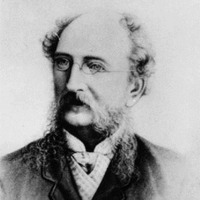To a Black Gin
Daughter of Eve, draw near—I would behold thee.
Good Heavens! Could ever arm of man enfold thee?
Did the same Nature that made Phryne mould thee?
Come thou to leeward; for thy balmy presence
Savoureth not a whit of mille-fleurescence:—
My nose is no insentient excrescence.
Thou art not beautiful, I tell thee plainly,
Oh! thou ungainliest of things ungainly;
Who thinks thee less than hideous doats insanely.
Most unaesthetical of things terrestrial,
Hadst thou indeed an origin celestial?—
Thy lineaments are positively bestial!
Yet thou my sister art, the clergy tell me;
Though, truth to state, thy brutish looks compel me
To hope these parsons merely want to sell me.
A hundred times and more I’ve heard and read it;
But if Saint Paul himself came down and said it,
Upon my soul I could not give it credit.
“God’s image cut in ebony,” says someone;
’Tis to be hoped some day thou may’st become one;
The present image is a very rum one.
Thy face “the human face divine!” . . . Oh, Moses!
Whatever trait divine thy face discloses,
Some vile Olympian cross-play pre-supposes.
Thy nose appeareth but a transverse section:
Thy mouth hath no particular direction,—
A flabby-rimmed abyss of imperfection.
Thy skull development mine eye displeases;
Thou wilt not suffer much from brain diseases;
Thy facial angle forty-five degrees is.
The coarseness of thy tresses is distressing,
With grease and raddle firmly coalescing,
I cannot laud thy system of “top-dressing.”
Thy dress is somewhat scant for proper feeling;
As is thy flesh, too,—scarce thy bones concealing:
Thy calves unquestionably want re-vealing.
Thy rugged skin is hideous with tattooing,
And legible with hieroglyphic wooing—
Sweet things in art of some fierce lover’s doing.
For thou some lover hast, I bet a guinea,—
Some partner in thy fetid ignominy,
The raison d’être of this piccaninny.
What must he be whose eye thou hast delighted?
His sense of beauty hopelessly benighted!
The canons of his taste how badly sighted!
What must his gauge be, if thy features pleased him?
If lordship of such limbs as thine appeased him,
It was not “calf-love” certainly that seized him.
And is he amorously sympathetic?
And doth he kiss thee? . . . Oh my soul prophetic!
The very notion is a strong emetic!
And doth he smooth thine hours with oily talking?
And take thee conjugally out-a-walking?
And crown thy transports with a tom-a-hawking?
I guess his love and anger are combined so;
His passions on thy shoulders are defined so;
“His passages of love” are underlined so.
Tell me thy name. What? . . . Helen? . . . (Oh, OEnone,
That name bequeathed to one so foul and bony
Avengeth well thy ruptured matrimony!)
Eve’s daughter! with that skull! and that complexion?
What principle of “Natural Selection”
Gave thee with Eve the most remote connection?
Sister of L. E. L. . . . of Mrs. Stowe, too!
Of E. B. Browning! Harriet Martineau, too!
Do theologians know where fibbers go to?
Of great George Eliot, whom I worship daily!
Of Charlotte Brontë! and Joanna Baillie!—
Methinks that theory is rather “scaly.”
Thy primal parents came a period later—
The handiwork of some vile imitator;
I fear they had the devil’s imprimatur.
This in the retrospect.—Now, what’s before thee?
The white man’s heaven, I fear, would simply bore thee;
Ten minutes of doxology would floor thee.
Thy Paradise should be some land of Goshen,
Where appetite should be thy sole devotion,
And surfeit be the climax of emotion;—
A land of Bunya-bunyas towering splendid,—
Of honey-bags on every tree suspended,—
A Paradise of sleep and riot blended;—
Of tons of ‘baccy, and tons more to follow,—
Of wallaby as much as thou couldst swallow,—
Of hollow trees, with ’possums in the hollow;—
There, undismayed by frost, or flood, or thunder,
As joyous as the skies thou roamest under,
There shouldst thou . . . Oooey! . . Stop! She’s off.
. . . No wonder.

